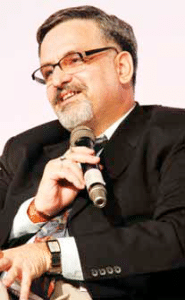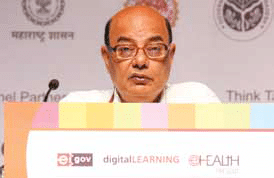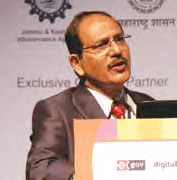|
|
 Pradeep Chaturvedi, Director Pradeep Chaturvedi, Director(IT), Rajya Sabha Secretariat,Government of India I believe school is a place where tomorrow lives and thus the concept of inclusive education should start right from schools. Also, from Ayurvedic era i.e. the Shruti (listen) and Smriti (remember), we have come to the new dimension now i.e. technology, so we need to expand it across the country to attain inclusivity. |
 Dr Gautam Bose, Deputy Director General, National Informatics Centre,Dept of IT, Ministry of Communications and IT, Government of India Dr Gautam Bose, Deputy Director General, National Informatics Centre,Dept of IT, Ministry of Communications and IT, Government of India
A knowledgeable population can play a better role in the democratic process and economic progress of the country. The government has some definite policies for inclusiveness like Sarva Shiksha Abhiyan, Sakhshar Bharat, EFA goals, etc as far as school education is concerned. We try to include every child into the school system, but in higher education many things still need to be done. |
 Prof B P Sanjay, Vice Chancellor, Central University of Tamil Nadu Prof B P Sanjay, Vice Chancellor, Central University of Tamil Nadu
With the aim of expanding inclusive education to the states that hitherto did not have a central university, a common Omnivous Act was introduced in the parliament and 12 new universities came up in different parts of the country and Tamil Nadu was one of them. The first dimension of the policy of the Government of India towards expanding inclusivity has been achieved by setting up of these new universities. |
 Mohammad Akbar Ali Khan, Vice Chancellor, Telangana University
At our university, we have different socio-economic background based students, almost 95 percent of them coming from the rural or agriculture backgrounds and belong to the economically weaker sections. They have special needs particularly in which English language communication is a big problem. Mohammad Akbar Ali Khan, Vice Chancellor, Telangana University
At our university, we have different socio-economic background based students, almost 95 percent of them coming from the rural or agriculture backgrounds and belong to the economically weaker sections. They have special needs particularly in which English language communication is a big problem.Andhra Pradesh nearly spends `6000-6500 crores annually on scholarships being given to students at higher education level. In our university 95 percent students get scholarships i.e. tuition fee, examination fee, hostel mess charges from the government as such. All this has been done to improve access and inclusivity. From 1950 to 2012, there has been a phenomenal increase in the number of universities and colleges in the country but when we look at the meager GER of around 18 percent then we realise the inadequate institutional development in India. As compared to the contribution of central universities to the GER, the state universities have done a better job in promoting inclusivity. In the 12th Five-Year Plan particular focus has been given to reflecting upon the disparities not only in terms of poor and middle class, but also on caste, ethnic, religion and gender lines and how to improve access to higher education. |
 Prof G L Datta, Chancellor, K L University Prof G L Datta, Chancellor, K L University
We have students from different languages, communication skills, barriers, diverse academic preparations, etc. More importantly there are students with different motivational levels, intellectual calibers and learning styles that makes the whole thing very complex and hence inclusive education has a meaning in this particular aspect as well. To cater to students with low level of academic preparations, we have bridge courses at first year level. We have remedial classes because we have a system that monitors progress of the students, their academic performance, and participation in the classes, etc, regularly. Again at the end of the year we have summer quarter organised for those students who otherwise find it difficulties during the course. To identify students for these courses we have student councils and mentors and we have a system where these mentors identify the students who require special attention. |








 The idea of a university comes from universality of education, which means providing education to all and giving equal opportunity to students across cultural, demographic or economic barriers. Although there is widespread willingness and support for inclusion, but there are some challenges on how to implement it a policy level
The idea of a university comes from universality of education, which means providing education to all and giving equal opportunity to students across cultural, demographic or economic barriers. Although there is widespread willingness and support for inclusion, but there are some challenges on how to implement it a policy level















